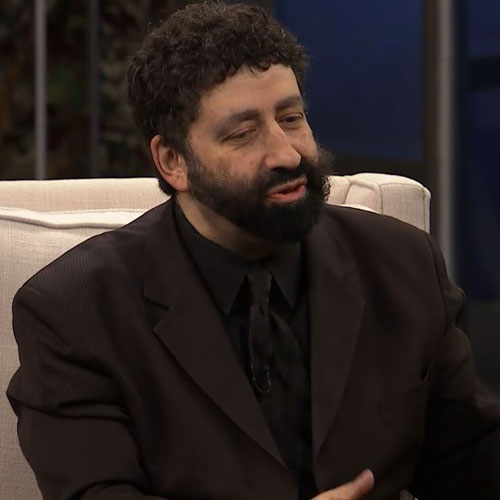See Jonathan Bernis on The 700 Club!


You still have time to do your part to leverage a $400,000 Matching Grant that will multiply your generosity to meet spiritual and physical needs in Zimbabwe.
Here’s what you need to know to HAVE YOUR GIFT DOUBLED …
Our team of skilled and dedicated medical professionals is heading to Chitsungo, Zimbabwe, early next year. We’ll host a 5-day Medical Clinic for thousands of impoverished people from a community called the Lemba, as well as for their neighbors.
The Lemba are Jews who, according to their oral tradition, migrated to Africa from Israel about 2,500 years ago. We call them “Lost Tribes” – pockets of Jewish people scattered around the world, many of whom struggle in poverty and isolation.
It’s heartbreaking to see the depth of suffering these people endure every day. That’s why I’m convinced our work in Chitsungo can have such a dramatic and lasting impact.
Will you help by sending the most generous gift you can to care for these struggling, isolated Jewish people?
Normally, each $30 you send would provide care and the opportunity to hear the Good News of Jesus, their Messiah, to one person. But right now, whatever you give will be DOUBLED to care for TWICE as many people!
Most important, though, your gift will provide the chance to share with them the motivation behind this ministry of compassion: our faith in Yeshua (Jesus), the One who died for them and wants them to receive the gift of eternal life. That’s what we want to do above all else.
During our recent Medical Outreach – in Buhera, Zimbabwe, just a few months ago – we treated 9,610 people. An amazing 315 accepted Yeshua as Messiah for the first time! Let me tell you about just one …
A 44-year-old woman named “Memory” was brought to the Clinic on a stretcher, suffering from many serious medical problems, including paralysis that kept her from walking or talking.
After she was examined by our medical team, we prayed for her. In a miraculous display of His limitless power, the Messiah healed her. Memory stood up, walked and talked! She was so happy, she asked our counselors to lead her in a prayer of salvation.
Miracles like this are why I hope you’ll give as generously as you can now. When you give by November 30, you’ll reach TWICE as many people with help and hope!

As Thanksgiving draws near, we might be tempted to try and catch up on giving thanks to God. But with all the gifts He’s given us throughout the year, it can be like visiting a vast warehouse of overlooked blessings. Where on earth do we start?
It may seem best to give “bulk” thanks for entire “pallets” of good things – like family, health, friends, ministry and work – and leave it at that.
It’s impossible to go back and thank Him for the daily surprises God had for us all year. Still, marvelous things await us if we pause to offer more than thankful generalities.
Sometimes, it just takes a few questions to call out the treasures of God’s gifts in our lives. Here are prompts to help you unpack some of the pallets in your storehouse of blessings. When you use these to reflect on God’s gifts – and perhaps even record your thoughts – you’ll uncover rich details to fuel intentional prayers of gratitude.
Family
Sometimes, the closer we are to people, the easier it is to take them for granted. But each one is a collection of blessings to us.
Name something you love about each of your children, your spouse, your parents, your siblings.
What is the most recent act of kindness you’ve seen each of them do?
What funny moment have you shared with each family member?
Identify a special characteristic each one possesses and how it contributes to your family, their circle of friends, the world.
Health
Our bodies are miracles. Things go wrong – especially as we age – but there are countless functions operating smoothly at every moment. And those moments allow us to experience more of life and the miracles it holds. Consider your five senses.
What is one of your favorite aromas?
What sounds make you happy? Relax you? Make you laugh?
List sights that warm your heart, exhilarate you, or fill you with awe.
Name one of the most beautiful things you’ve ever seen.
What’s the best thing you’ve ever tasted?
What illness or other health problem has been resolved for you or someone you love during this past year?
Ministry
Using your skills and talents for God’s purposes is rewarding. He wants to use each of us to serve others and glorify Him in our circles of influence. And it doesn’t have to be in a formal program to qualify as ministry.
What acts of giving to others do you enjoy? Have you offered words of encouragement? Led someone to the Bible’s truth and shared the Good News of Yeshua?
Name some ways you have been blessed by serving others.
Work
It is truly a blessing to find meaning and purpose in your employment. If you are among the fortunate people who love their jobs, you are undoubtedly very grateful. If your current employment is less than satisfying, look for God’s gifts hidden inside the daily tasks of your job.
Name one thing you really like about your job.
Who is a coworker you enjoy seeing each day? What makes that person pleasant company?
How has your current employment helped you grow as a person or in your relationship with God?
Friends
We laugh and share our hearts with them, enjoy hobbies together, and lift one another other up. Each friend is a gift from God.
Name the most meaningful thing you share in common with your best friend.
What qualities drew you to each of your friends? What makes you feel comfortable with them?
List a specific example of how one of your friends helped you through a challenging time.
Name a memory you’ve shared with each friend – an adventure, a funny moment, or a heart-to-heart conversation
Whether we schedule a period of solitude to unpack our blessings all at once, or we reflect a little each day, taking time for intentional thankfulness can open our eyes to the “gifts within the gifts” we receive from God.
May your adventure in thanksgiving bring you much joy as you unpack God’s gifts. As you lay them out and examine them, may you thank Him from an overflowing heart and draw closer in sweet fellowship to the One who loves to give.
Did you cut the cable cord on your television? In addition to Daystar and TBN, Jewish Voice with Jonathan Bernis can be watched on Roku, Apple TV, Fire TV, IOS, YouTube and Vimeo! Now you don't have to miss the important interviews regarding Israel and the End Times, you can simply watch the show on your tablet, cell phone or desktop!
Finding our channel in Roku, Apple and Fire TV is simple. Just launch the app and search for Jewish Voice with Jonathan Bernis. The channel is free and can easily be installed on your device. You can also subscribe to our channel on YouTube or Vimeo.
YouTube: https://www.youtube.com/user/jewishvoicetoday

In an astounding development over the weekend, Lebanese Prime Minister Saad Hariri resigned. According to a report in The Washington Post, the surprise move ends Hariri’s alliance with the powerful Hezbollah terrorist movement and raises the threat of conflict in Lebanon.
Hariri announced his resignation in the Saudi Arabian capital of Riyadh on Saturday, citing the influence of Iran over the Lebanese government as the reason. His move puts Lebanon in the middle of a growing power struggle between Tehran and Riyadh.
Hariri said in a televised address from Riyadh that, through Hezbollah, Iran has created “a state within a state” in Lebanon. He accused Iran of sowing “sedition, devastation and destruction in any place it settles.”
“I want to tell Iran and its followers that they are losing in their interferences in the affairs of Arab nations. Our nation will rise just as it did before, and the hands that will harm it will be cut,” Hariri said. Many observers took his statements as foreshadowing the beginning of a broader effort, backed by Saudi Arabia, to confront Iran.
The Trump Administration, which has been more assertive toward Iran recently, did not immediately comment. It’s unclear whether the President was involved in what appears to be a Saudi initiative to answer Iran’s meddling in Lebanon.
An already shaky alliance ends
The resignation appears to end the shaky alliance between Hariri, a Sunni Muslim and longtime ally of Saudi Arabia, and the Iran-backed Shiite Hezbollah terrorist group. The arrangement helped Lebanon distance itself from the violent civil war in neighboring Syria, even as concerns were deepening among Iran’s foes about the growing influence of Tehran in Lebanon.
Israel, which has threatened recently to go to war against Hezbollah in Lebanon, said it welcomes Hariri’s resignation. According to a statement issued by the office of Prime Minister Benjamin Netanyahu and reported in The Washington Post, Hariri’s decision is “a wake-up call to the international community to take action against Iranian aggression.”
Feared for his life
In his resignation statement, Hariri hinted he believes his life is in danger. He described the atmosphere in Lebanon as similar to the national mood when his father, Prime Minister Rafiq al-Hariri, was assassinated in 2005, after resigning from office. “I sensed what is being woven in secret to target my life,” Hariri said.
An attempt on Hariri’s life “had been thwarted in Beirut a few days ago,” according to the Saudi news website Al-Arabiya, although Lebanese security officials said they had no knowledge of any such attempt.
The assassination of Hariri’s father in a 2005 car bombing is widely blamed on Hezbollah operatives. The murder has been followed by years of tension in Lebanon between Hezbollah and U.S.-backed allies in the Sunni and Christian communities.
The Washington Post reports that a string of bombings killed more than a dozen Hariri allies and Christian politicians. The tensions culminated with Hezbollah’s armed takeover of the streets of West Beirut in 2008, which secured their political influence over Lebanon.
Since the outbreak of the Syrian civil war in 2011, Hezbollah, through Iran’s backing, has emerged as a powerful military and political force in the region. Designated a terrorist organization by the U.S., the movement has sent thousands of its members to Syria to fight for Syrian President Bashar al-Assad in its war with Islamic State.
Late last week during an interview with Lebanese TV, Saudi State Minister for Gulf Affairs Thamer al-Sabhan sharply criticized Hezbollah, calling for its “toppling” and promising “astonishing developments” in the coming days.
Al-Sabhan had met earlier with Hariri in Saudi Arabia. Hariri abruptly returned on Friday before his bombshell announcement on Saturday.
In a series of tweets after meeting Hariri, al-Sabhan described it as a “long and fruitful meeting” that resulted in agreement over many issues that concern the Lebanese. He criticized the Lebanese government and said, “What comes is better, God willing.”
He earlier had said that those who cooperate with Hezbollah must be “punished.”
Part of a bigger plan?
If this plays out as many observers think it might, Prime Minister Hariri’s resignation may be the next step in a Saudi Arabian plan to increase stability in the Middle East and counter the growing influence of archrival Iran.
You’ll recall that in June, Saudi Arabia joined four of its Arab neighbors in severing ties with Qatar, saying Qatar supports Islamic terrorism and Iranian designs on the region. Some analysts saw the escalation as a sign that the Saudis and their allies are growing bolder in their campaign to fight terrorism in general – and Iran state-sponsored violence in particular.
This amazing development will play out in the coming weeks. And it may get very interesting if the Saudi’s deliver on their promise of “astonishing developments” in the coming days.
All we can do is pray that these events bode well for the state of Israel and her people. Islamic infighting may bring greater security to the region. Or it may bring greater chaos. We don’t know.
But we serve the God who does know. Let’s ask Him to protect His people – and give us even more opportunities to reach the Jewish people with care, compassion and the Good News of Jesus their Messiah.
We also appreciate your prayers for us here at Jewish Voice Ministries as we bring hope and health to Jewish communities around the world. Your prayers and financial support are such an encouragement, as they make this life-transforming work possible.

